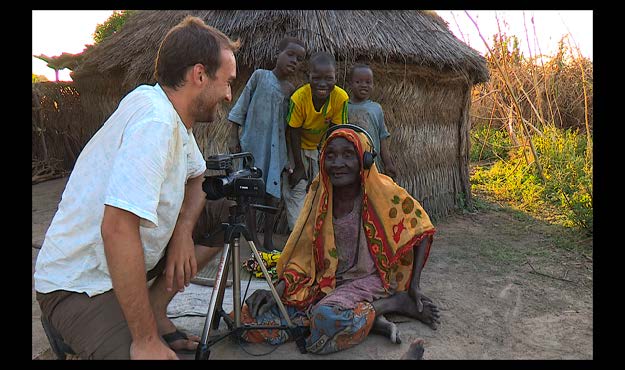
Projection du film “Et si Babel n’était qu’un mythe ?”
May 15, 2019 3:00 pm - May 15, 2019 5:00 pm
Europe and North America | France | Paris | 65 Rue des Grands Moulins
Cultural events
Réalisatrice : Sandrine Loncke
Durée : 53 min.
Synopsis du film : En mission de recherche dans le Sud
du Tchad pour documenter la culture d’une petite
société, les Láàl, l’ethnologue-réalisatrice Sandrine
Loncke est frappée par le multilinguisme des habitants.
Les sociétés qui peuplent le coeur du continent africain
forment une telle mosaïque qu’il n’est pas rare
d’y croiser des villageois parlant six à sept
langues. Mais pour combien de temps encore ? Les
chiffres sont sans appel : d’après l’Instance permanente
sur les questions autochtones de l’ONU, une langue
disparaît toutes les deux semaines de la surface de la
terre. S’interrogeant sur les enjeux de leur démarche,
la réalisatrice décide de suivre pas à pas le travail
colossal du responsable de projet, Florian Lionnet, un
jeune linguiste passionné qui s’est donné pour mission
d’élaborer, en collaboration avec les villageois, la
grammaire, le dictionnaire, et finalement l’écriture du
láàl, petite langue exclusivement orale parlée dans deux
villages, par 700 personnes. À ses côtés, on découvre à
quel point la culture d’une société est encodée dans sa
langue. Que cette dernière vienne à disparaître, et ce
sont des pans de savoirs qui se voient, à très court
terme, menacés…
Ethnomusicologue africaniste, Sandrine Loncke est maître
de conférences à l’Université Paris 8 et membre
du Centre de recherche en ethnomusicologie (CREM-LESC,
CNRS). Elle est l’auteure de plusieurs ouvrages
sur les sociétés peules d’Afrique de l’Ouest (Burkina
Faso et Niger), et du documentaire plusieurs fois primé
« La danse des Woɗaaɓe » (Grand prix Nanook – festival
Jean Rouch 2010). Son dernier film « Et si Babel
n’était qu’un mythe ? » (2019) a été réalisé dans le
cadre d’un programme de recherches pluridisciplinaires
mené au Sud du Tchad, dans la région du Moyen-Chari
(programme DOBES – « Documentation of
endangered languages », en partenariat avec l’Université
Humboldt de Berlin et l’Institut Max Planck de
Nimègue). Que ce soit par l’écrit, l’audiovisuel ou le
multimédia, elle place au coeur de ses préoccupations
l’étude et la transmission des patrimoines
immatériels des sociétés minoritaires.
Cette projection sera suivie d’une discussion avec la
réalisatrice et des linguistes de terrain travaillant
sur les langues « en danger » en Afrique, tous issus du
laboratoire LLACAN.
(Inalco/CNRS).
